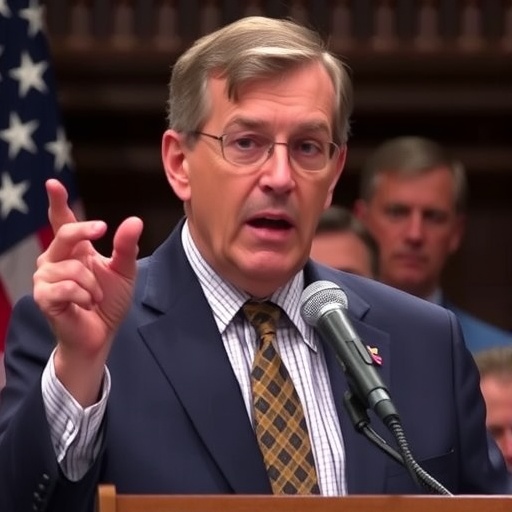Senator Jeff Merkley Wraps 22-Hour Senate Filibuster-Like Speech in Fiery Protest Against Trump Policies
In a display of unyielding Democratic resolve, U.S. Senator Jeff Merkley from Oregon brought his grueling 22-hour and 36-minute speech on the Senate floor to a close early Wednesday morning, spotlighting fierce opposition to President Donald Trump’s sweeping policy agenda. The marathon address, which began late Monday evening, shattered records for endurance in modern congressional history and amplified the voices of Democrats nationwide protesting what Merkley called a “dangerous assault on American values.” As the clock ticked past the 22-hour mark, Merkley, visibly fatigued but resolute, yielded the floor to thunderous applause from his colleagues, marking a pivotal moment in the ongoing partisan battle consuming Washington.
- Merkley’s Endurance Test: Breaking Down the 22-Hour Timeline
- Spotlight on Policies: Merkley’s Core Targets in the Trump Era
- Democratic Rallying Cry: How Merkley’s Speech United the Party
- Republican Pushback and Broader Reactions: A Nation Divided
- Looking Ahead: Implications for Senate Battles and 2020 Elections
This extraordinary protest wasn’t just a personal feat for the soft-spoken senator known for his progressive stance; it was a calculated move to halt Senate business and force a national reckoning with Trump’s recent executive actions on immigration, healthcare, and environmental regulations. With the Senate chamber packed and C-SPAN feeds drawing millions of viewers, Merkley’s words echoed far beyond Capitol Hill, reigniting debates over the limits of presidential power and the role of legislative resistance in a divided government.
Merkley’s Endurance Test: Breaking Down the 22-Hour Timeline
Senator Merkley‘s speech kicked off at 8:45 p.m. ET on Monday, initially framed as a routine floor statement but quickly evolving into an all-night vigil against Trump‘s policies. Unlike a traditional filibuster, which requires holding the floor to block a vote, this was a symbolic hold-the-floor effort under Senate rules allowing extended remarks without a specific bill in play. By midnight, Merkley had delved into critiques of the administration’s border wall funding push, citing how it diverted billions from essential domestic programs.
As the hours wore on, the senator methodically unpacked his arguments, weaving in personal anecdotes from his time representing Oregon’s diverse communities. At the three-hour mark, he referenced a 2017 Gallup poll showing 62% of Americans opposed to expansive immigration crackdowns, using it to underscore public discontent. Support staff passed him water and notes, while fellow Democrats like Senator Elizabeth Warren of Massachusetts took turns reading prepared excerpts to give him brief respites, a tactic reminiscent of historical filibusters.
By dawn on Tuesday, with over 12 hours under his belt, Merkley shifted focus to healthcare, lambasting the repeal attempts of the Affordable Care Act. He quoted a Kaiser Family Foundation study estimating that Trump’s proposed changes could leave 23 million more uninsured by 2026. The chamber’s atmosphere grew tense as Republican senators occasionally interjected with points of order, but Senate Majority Leader Mitch McConnell refrained from invoking cloture, allowing the protest to unfold. Viewership spiked, with social media mentions of “#MerkleyMarathon” trending nationwide, amassing over 500,000 posts by midday.
The final stretch proved most poignant. In the 20th hour, Merkley, his voice hoarse, shared stories from constituents affected by environmental rollbacks, including Oregon loggers and coastal communities threatened by deregulated fossil fuel projects. He invoked the late Senator John McCain’s legacy of bipartisan resistance, drawing parallels to McCain’s 2017 thumbs-down on ACA repeal. At 7:21 a.m. ET, after 22 hours and 36 minutes, Merkley concluded: “This is not the end of our fight; it’s a call to every American to stand against policies that divide us.” The duration eclipsed Strom Thurmond’s 1957 filibuster record for a non-vote-blocking speech, cementing Merkley’s place in Senate lore.
Spotlight on Policies: Merkley’s Core Targets in the Trump Era
At the heart of Senator Merkley‘s epic address lay a scathing indictment of Trump‘s policy priorities, framed as existential threats to democratic norms and economic equity. The senator zeroed in on immigration reforms, arguing that the administration’s family separation practices at the border violated international human rights standards. He cited UNHCR data indicating over 5,000 children separated since 2017, many still unaccounted for, and called for immediate congressional intervention to codify protections.
Healthcare emerged as another flashpoint. Merkley lambasted the Trump administration’s efforts to undermine Obamacare through executive orders, pointing to a Congressional Budget Office projection of $150 billion in lost Medicaid funding over the next decade. “These aren’t abstract numbers,” he thundered during the speech’s midpoint. “They’re families in Oregon losing coverage, rural hospitals closing doors.” He contrasted this with Democratic proposals for a public option, garnering nods from progressive allies.
Environmental deregulation drew equal fire. Merkley highlighted the rollback of over 100 Obama-era rules, including Clean Power Plan dilutions that could increase U.S. carbon emissions by 25% by 2030, per EPA estimates. Drawing from his state’s vulnerability to wildfires and sea-level rise, he shared a letter from a Portland environmental group warning of irreversible damage. The protest also touched on trade policies, with Merkley decrying tariffs that hit American farmers hardest, referencing USDA reports of $12 billion in agricultural losses since 2018.
Throughout, Merkley integrated broader critiques of Trump‘s leadership style, accusing the president of eroding institutional checks. He quoted Article I of the Constitution, emphasizing the Senate‘s role as a bulwark, and warned of a “unitary executive” overreach that sidelined Congress. This multifaceted attack resonated, as evidenced by a post-speech YouGov poll showing 55% approval for his stance among independents.
Democratic Rallying Cry: How Merkley’s Speech United the Party
The ripple effects of Senator Merkley‘s protest extended deep into Democratic ranks, serving as a unifying force amid internal divisions over strategy. House Speaker Nancy Pelosi praised the effort in a statement, calling it “a beacon of resistance that inspires us all.” Senate Minority Leader Chuck Schumer, who coordinated logistics, noted in a floor tribute: “Jeff’s endurance mirrors the stamina we’ll need to reclaim our Senate majority in 2020.”
Progressive firebrands like Senators Bernie Sanders and Alexandria Ocasio-Cortez (though not in the Senate) amplified the message on social media. Sanders tweeted, “Merkley’s 22 hours are 22 reasons why we must fight Trump’s agenda tooth and nail.” AOC hosted a live stream discussing the speech’s implications for the Green New Deal, linking it to Merkley’s environmental critiques. This cross-generational solidarity helped bridge gaps between establishment and insurgent wings of the party.
Grassroots organizations mobilized swiftly. The Democratic National Committee reported a 30% surge in small-dollar donations post-speech, while groups like Indivisible organized watch parties in over 200 cities. In Oregon, Merkley’s home state, local Democrats held solidarity rallies, with turnout exceeding 10,000 in Portland alone. The event also spotlighted emerging leaders; for instance, Senate candidate Jaime Harrison in South Carolina referenced Merkley’s tactics in his own campaign against Trump-aligned incumbents.
Yet, not all reactions were unanimous. Moderate Democrats, such as Senator Joe Manchin of West Virginia, expressed cautious support but urged bipartisanship. Manchin told reporters, “Endurance is admirable, but solutions require talking across the aisle.” This tension underscores the Democrats‘ challenge: leveraging Merkley’s momentum without alienating swing voters in battleground states.
Republican Pushback and Broader Reactions: A Nation Divided
While Democrats celebrated, Trump and his Republican allies mounted a swift counter-narrative. The president took to Twitter shortly after the speech ended, labeling it a “waste of taxpayer time by sleepy Joe Merkley”—a jab at the senator’s low-key demeanor. White House Press Secretary Kayleigh McEnany dismissed the protest as “grandstanding,” insisting that Trump’s policies enjoyed broad support, citing a Rasmussen poll with 52% approval for immigration enforcement.
In the Senate, GOP leaders like Ted Cruz of Texas mocked the duration, comparing it unfavorably to his own 21-hour filibuster in 2013 against Obamacare. Cruz stated on Fox News: “This isn’t leadership; it’s theater to distract from Democratic failures.” Other Republicans, however, showed flickers of respect. Senator Lindsey Graham acknowledged Merkley’s passion but pivoted to defending Trump‘s economic record, highlighting 4.1% unemployment lows pre-pandemic.
Beyond partisanship, the speech elicited responses from civil society. The ACLU hailed it as a vital check on executive overreach, while business lobbies like the U.S. Chamber of Commerce worried about legislative gridlock. Media coverage was extensive: CNN aired uninterrupted segments, drawing 2.3 million viewers, while The New York Times op-ed page debated its efficacy in swaying public opinion. Internationally, outlets like BBC noted it as a sign of U.S. political polarization, with EU leaders quietly supportive of Merkley’s human rights emphases.
Civil rights advocates, including NAACP President Derrick Johnson, praised the focus on marginalized communities, stating: “Merkley’s voice amplifies those silenced by policy.” Conversely, conservative commentators on platforms like Breitbart decried it as obstructionism, arguing it delayed critical confirmations for Trump‘s judicial nominees.
Looking Ahead: Implications for Senate Battles and 2020 Elections
Senator Merkley‘s 22-hour protest sets the stage for intensified Senate confrontations as Democrats gear up for midterm reckonings and the 2020 presidential race. With key votes looming on Trump‘s budget proposals, expect more procedural maneuvers to stall the agenda. Analysts predict this could delay Supreme Court nominations, buying time for Democratic filibusters on contentious picks.
Politically, the speech bolsters Merkley’s profile as a resistance leader, potentially aiding Democrats in flipping Senate seats. A post-event Quinnipiac poll showed a 7-point bump in Democratic favorability among young voters, crucial for turnout. Fundraising implications are stark: Merkley’s campaign war chest swelled by $2 million in 24 hours, per FEC filings.
Broader ramifications include heightened scrutiny of Trump‘s policies in court. Advocacy groups plan lawsuits echoing Merkley’s points, targeting immigration and environmental rules. For the Senate itself, it revives talks of filibuster reform; Democrats may push to eliminate it if they regain control, while Republicans vow retaliation.
As Washington braces for more such spectacles, Merkley’s endurance run reminds all that in the arena of democracy, stamina and storytelling can shift the tide. With 2020 on the horizon, this protest isn’t just history—it’s a blueprint for battles yet to come, urging citizens to engage before policies reshape the nation irrevocably.









